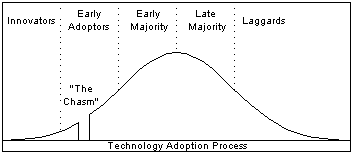Email Glen Greer
Customers for Electronic Security Equipment in the USA
There is no point in having a great product, detailed plan, outstanding intelligence on your competitors or the finest advertising campaign if it is not rooted in an understanding of customers.
There are many, many ways to classify, or segment, customers into homogenous groups. Segmentation allows a common approach to be taken to one or more of the challenges of making and selling a product. In fact, it is often necessary to create new methods of segmentation for new products. The common methods of segmenting customers - size, longevity or location are not necessarily differentiators in how a company will react to a new product.
It can be just as valid to start with the technology adoption model and classify targets according to when they are likely to be interested in your product.

What you are looking for is groups of customers that have a broadly consistent set of requirements relative to your product.
For established products the following segmentation is usually a good starting point and we often use it when working with new clients. It classifies alarm dealers into groupings characterized by how they do business, the types of products they use, how they source them and their approach to new products. For companies who have not used segmentation before, it can be salutory to consider how much the message about a product needs to change from one segment to another. Yet in many cases, companies will be using the same sales material and advertising across the entire industry.
National Installing Companies
Companies who operate across the entire US. These are major corporations and have many of the characteristics you would expect. For the most part they are publicly traded companies.. It is a small group, and the best way to define them is probably to name them: ADT (part of Tyco), Honeywell, Ameritech (Securitylink, National Guardian), Protection One, Brinks.
Regional installing companies
Major companies whose activities span more than one state. They differ from the National companies in one important way that affects suppliers. They have not usually developed the bureaucratic structure that exists in the national companies. They may still have just a small executive team, the same team, in many cases that built the business. Not all have ambitions to be national, though all are active in acquisitions. The largest players are very close to national in scope and typically growing rapidly by acquisition. They are also disappearing at a rapid rate as they are being acquired by national companies.
Local installing companies
Companies with one or two offices (in relatively close proximity), ranging from five to one hundred employees. They differ from the next category in that they are professional, have premises, are licensed and insured and may be creditworthy.
Other alarm dealers
Small, one or two man companies, buying all their equipment through distribution, usually with a credit card. They do one or two systems per week, almost all residential. While a few will graduate to professional status and survive, most come and go. Today, the vast majority sells their accounts to companies like Protection One, rather than build recurring revenue. This group is often referred to as trunk slammers - supposedly the closing of the trunk of the vehicle after the system is installed represents the end of their interest in the customer.
Specialist alarm dealers
This category covers a relatively small number of companies that focus on a niche in the end user market. While national specialists all focus on mass market residential, this group includes companies that focus on various aspects of the commercial market as well.
ESD’s and System Integrators
Engineered System Distributor is a term used primarily in the specified fire market in the US. Here it is used along with "system integrator" to apply to all the dealers who focus on the commercial, specified market, whether fire, access or intrusion. While not every job is specified, in cases where it is not, it is usually described as "negotiated". Only very capable companies will be selected for the negotiation, usually by a specifier of some kind. It is only companies that have previously won bids for the same kind of system that are invited to participate.
This market is often for installations in new construction, for customers that have a security director and/or have used a design-consulting firm to create a specification for the security system. Dealers in this segment look and behave quite differently from the average alarm company. They have professionally qualified design staff, do architectural drawings and are accustomed to working with architects and other professionals.
Commercial End users
Naturally, end users often buy their security equipment and services from one of the above type of intermediaries. However, corporations, especially large ones, will sometimes deal directly with equipment manufacturers. Some of these companies have all the capabilities of large alarm dealers, including well trained installers and their own central stations.
Residential end users
A category ignored by many of the manufacturers in the industry are homeowners who wish to install their own security equipment. In the past, such customers were limited in what they could buy to that which is available in Radio Shack, Home Depot and other retailers. Today, they can buy professional alarm equipment over the internet and growing numbers are doing so.